Thermal Analysis
BAEHR pushrod micro-penetration viscometer
| The micro-penetration viscometer is used to directly measure viscosities in the range of 107 to 1011 Pa s in a glassy sample. Thereby an Iridium-indenter is penetrated into the sample during an isothermal segment. The viscosity is directly correlated to indentation-depth and can easily be calculated. Working temperatures: BÄHR DIL 802V: up to 1650°C Gas flow: Argon (5.0) at 25 cm3/min |
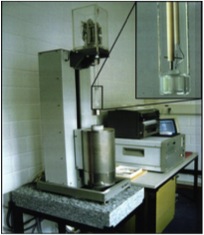 BÄHR® DIL 802V |
Differential Scanning Calorimetry
| Differential Scanning calorimetry is a frequently used method in geosciences. Here, we measure the thermodynamic properties of an unknown sample compared to a reference material as a function of temperature. It is thereby possible to study the thermal history of geomaterials, i.e. volcanic glasses. Working temperatures/pressures: NETZSCH DSC 404 C Pegasus: up to 1650°C, ambient PSETARAM Sensys EVO DSC: up to 830°C, 400 bars Gas flow: Argon (5.0) at 25 cm3/min |
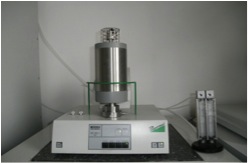 NETZSCH® DSC 404 C Pegasus 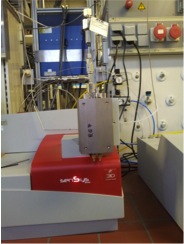 SETARAM® SENSYS EVO DSC |
Simultaneous Thermal Analysis (combined Differential Scanning Calorimetry & Thermogravimetry)
| The STA is a combination of a DSC and a thermogravimetric instrument. Besides heat capacity measurements one is able to study mass changes of a sample material, as a function of temperature with time, and additionally of pressure and gas composition. Working temperatures: NETZSCH® STA 449C Jupiter: up to 1650°C Gas flow: Argon (5.0) at 25 cm3/min |
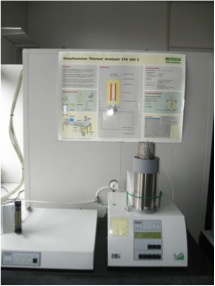 NETZSCH® STA 449C Jupiter |
Pushrod Dilatometry in horizontal geometry
| Volumetric properties are determined on glassy materials using a push-rod dilatometer in horizontal geometry.This includes for example the measurement of thermal expansion of a material applying a controlled temperature program. Working temperatures: NETZSCH® DIL 402C: up to 1650°C Gas flow: Argon (5.0) at 25 cm3/min |
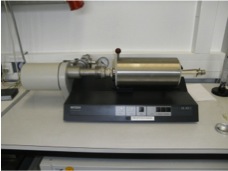 NETZSCH® DIL 402C |





